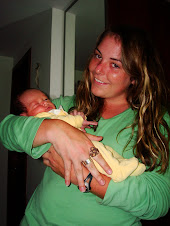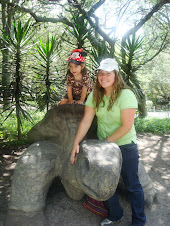Pan de Vida (The Bread of Life)
"I am the bread of life. He who comes to me will never go hungry, and he who believes in me will never be thirsty."
 I’ve been stateside for about a month now and must admit that I am suffering from an acute case of reverse culture shock. I thought that as a means of reliving the journey and restoring my spirit that I would continue to write about the adventure. So, tHIS is the rest of my story.
I’ve been stateside for about a month now and must admit that I am suffering from an acute case of reverse culture shock. I thought that as a means of reliving the journey and restoring my spirit that I would continue to write about the adventure. So, tHIS is the rest of my story.Several weeks into the start of living in Quito and thrashing against the disparity of the streets our group of cultural exchange students (extranjeros) stumbled upon a

The Word takes on new meaning, maybe something closer to its original intent, when you proclaim the Good News of the Gospel before the desperate, starving, and ragged by saying, "Therefore I tell you, do not worry about your life, what you will eat; or about your body, what you will wear. Life is more than food, and the body more than clothes” (Luke 12:22-23). Speaking from the comfort of my luxurious lifestyle, I see the poeticism of Jesus’ teaching, but for a woman like Gladys I was afraid Jesus’ message might overstretch its mark. A single mother of two, whose rent on a one room, dirt floor, alleyway lean-to was backed up, whose daily life was pedaling raveled, alpaca scarves on the streets as a member of the millions who compose Ecuador’s informal street economy. A mother, whose worry was not the melodrama of what to do with her life and what it means, but how to survive the living of it. Talk of a poor and jobless economy, excessive prices and stacked bills, and overwhelming debt are not haunting demons for Gladys because she has never known a life with anything else. How do you tell a mother who is suffering with the task of feeding her starving children not to worry? The answer for the struggling members of Pan de Vida is simple, you don’t have to. They know that God’s faithfulness is GREAT, so theirs is too. They believe (period). I have seen faith and faithfulness on steroids, if you will; a trust in God that surpasses Jepthath’s blind obedience and echoes a more resounding devotion that remembers God’s promise and affirms God’s provision,

My very first day at Pan de Vida, I was asked to pray in a Sunday school room full of all ages of small children. It was the very first time I had ever prayed publicly in Spanish and my voice was quivering. God gave me the words to converse in a language that was slowly become more and more familiar. I admit that I looked up a time or two to gage the reaction of the room and I was greeted by an abundance of curiously peeking eyes as well. We held a lesson on what it means to love one another and then drew hearts with broken crayons on previously used pieces of paper. Sitting in child sized chairs my friend and I were swarmed by little hands, little hugs, and little kisses. There was a set of twins who were fourteen and one of the girls, Catarina, was particularly glued to me. She wore what had one time been white, knee high socks, a plaid skirt, and a chewed navy sweater. Her face was smudged by days of dirt and her dark hair swept back into a single braid that had become severely matted at the nape of her neck from a neglectful lack of attention. Once she latched onto my hand, it seemed she just couldn’t bear to let it go.
We went outside to break bread together and the children received a juice box, piece of bread, and a citrus. We sat around and laughed as the kids would shout out a word in Spanish and then want to know its English equivalent. Tricky situations would arise as they would plead to know what a granadilla is in my native language and I would have to explain that there is no word because, much to their devastating dismay, no such fruit exists in the U.S. or EE.UU.
Catarina had stayed by my side and when she came back from throwing her trash away she sat down in my lap. I began to pick through her matted hair, strand by strand. Every now and then she would lean back against me, look up and just smile. As I held Catarina, I prayed a special blessing upon her life, a beautiful child who knows too much despair and not enough love, but who God has not forgotten. I couldn’t help but repeat, Thank you GOD for sending me, Thank you God for sending me. In that moment I knew what it is to feel the instantaneous reception of grace, to feel what it is to be graced with grace upon grace upon grace.

To hear the origin story told by founder, Oscar Aguirre, a young Ecuadorian businessman, who was approached by a 12-year-old boy, Juan Alpapucho, while leaving church one day; it was a case of call and response. Juan was one of Quito’s many shoe shine boys wandering the streets with polish stained hands and red rags supplicating to clean the shoes of the rich for a mere quarter. Oscar recalls the shame while he waited for his shoes to be shined and watched the beggars at the gate of the church weighing heavy on his heart, he thought, “Lord, here I am, a 33-year-old man, with a master’s degree and my own company, but what’s more a Christian, and here is this little boy cleaning my feet.” He asked Juan when he had last eaten and when the frail boy couldn’t remember Oscar walked with Jaun to a nearby bakery. Juan first refused to enter, saying the clerk would chase him out as street children aren’t allowed to enter the shop, but they walked in together and for fifty cents, Juan had lunch.
The very next Sunday, Oscar brought him a children’s Bible, and Juan brought three more hungry children. As they received their bread, one of them prayed for Oscar and thanked God for his kindness in buying them bread, and something happened in Oscar’s heart. He approached the English Fellowship Church board, asking for help in starting a feeding program for the area’s poorest on Sunday mornings. He was given time in the pulpit to ask for volunteers. And Pan de Vida, the Bread of Life
In 2001, Pan De Vida had its first meeting in a driveway where less than twenty people attended. The menu was scrambled eggs with ham, rice, a banana, a piece of bread and a glass of milk. They sang some hymns and share a short Bible message. Nowadays, Pan de Vida serves about 1350 meals per month and has reached as many as one hundred and eighty in a single meeting. Pan de Vida is very blessed by partnerships with some very prominent organizations like Extreme Response International, Samaritans Purse, and Canada’s Mustard Seed.
The

I was issued a very powerful call from the pulpit by one of my pastors at my home church Calvary UMC before my departure. It was a call for the New Year that we may know and love the poor as brother and sister. What made the message so compelling was the fact that the lips from which they were delivered have kissed the wounds of the broken, whispered love to the unwanted, and spoken the radical truth of the Gospel setting a living example of what it is to model the way of being in relationship with and loving the downtrodden. I found myself recycling the words throughout my time in Ecuador and Pan de Vida became a blessed gateway for such relationships. After a multitude of invitations into humble, Ecuadorian homes, I realized just how many moments there are to be love instead of charity, to be Christ instead of the crucifixion, to be justice instead of the judge. I experienced a love that was rawer than ever before. A love that like the cafecitos we shared was bold, pure, sweet, concentrated and overall, extremely rich. A love that was not afraid to welcome me, a foreigner, into the confines of a cramped, dirt floored temple, a love that was not frightened by the vulnerability of praying intimate desires and shames of the heart, a love that trembles in the offering; risking and giving everything and not wanting for anything.
Shane Claiborne, servant, missionary, and author of, "The Irresistible Revolution: Living as an Ordinary Radical" says, “I had come to see that the great tragedy of the church is not that rich Christians do not care about the poor but that rich Christians do not know the poor. Once the rich truly know the poor, there will be no more poverty;” he’s surely right.
Pain plagues this world, but I’ve realized that bargaining with God is cheap and pointing fingers at God is self-condemning. We always seem to make halfhearted, faulty promises as a means of supplication for our own wills that are sure to make Abraham and God chuckle, then we have the nerve to question God when we don’t understand the world. Why God, are children starving and why God, are people poor? Maybe, we should ask ourselves those questions and be a little more demanding of one another.
"And that’s when things get messy. When people begin moving beyond charity and toward justice and solidarity with the poor and oppressed, as Jesus did, they get in trouble. Once we are actually friends with the folks in struggle, we start to ask why people are poor, which is never as popular as giving to charity. One of my friends has a shirt marked with the words of late Catholic bishop Dom Helder Camara: “When I fed the hungry, they called me a saint. When I asked why people are hungry, they called me a communist.” Charity wins awards and applause but joining the poor gets you killed. People do not get crucified for living out of love that disrupts the social order that calls forth a new world. People are not crucified for helping poor people. People are crucified for joining them." — Shane Claiborne (The Irresistible Revolution: Living as an Ordinary Radical)
Shane Claiborne wrote to Mother Theresa to ask about her

I’m thankful that the most important thing God was teaching me in Ecuador was not Spanish, but how to be a better servant for the Kingdom.
If you are ever in Ecuador, by all means, travel and revel in the undiscovered gems that she is; climb the roaring volcanoes, snorkel in the exotic Galapagos, immerse yourself in the living indigenous cultures, journey to the Amazon and soak in the most biodiverse hectare of land in the world, but if you want to change your life, if you want to upset the very nature of your being, go to the corner of Brasil y Americas with willing hands and an open heart and be transformed. The height of your joy and the depth of your despair will never quite emote the same and Christian love will never run so deep.
So take up your cross and follow Jesus into the slums of the poor and the homes of the broken.
Spread the WORD. Be a witness.




No comments:
Post a Comment